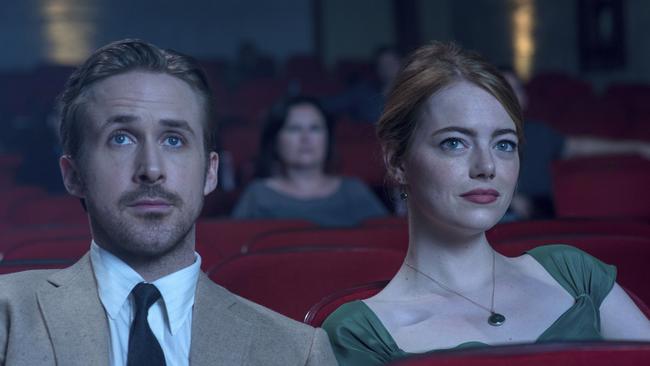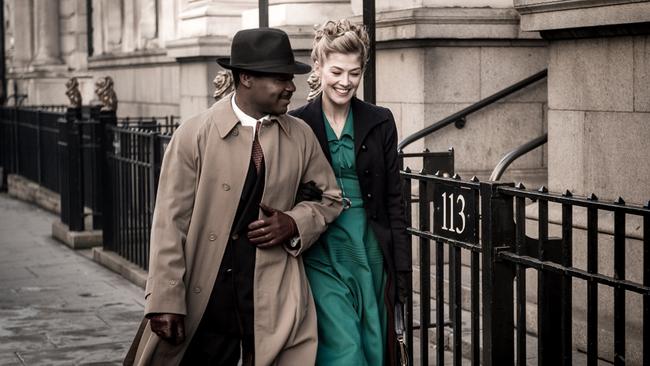Film reviews: La La Land with Ryan Gosling; A United Kingdom
The much-derided musical has been revived in a contemporary boy-meets-girls romance.

Roger Ebert, who died in 2013 and was one of the world’s most highly regarded film critics, once asserted that “it is insufferable to claim you never see musicals — or horror movies, or westerns, or war movies. That’s confusing ignorance with taste. The trick is to find the good ones.” I’m old enough to have started going to the cinema when musicals (and westerns) were the most popular genres; hardly a week went by when such films weren’t a part of the new releases. Most of the Hollywood musicals were originals, not filmed stage shows, including the greatest of them all, Singin’ in the Rain (1952), but later on, as the genre slipped out of favour with the advent of new forms of popular music (rock especially), film versions of stage shows dominated. And the musical, like the western, somehow became a despised genre for many, viewed as quaint and old-fashioned and therefore not worth seeing.
The third feature from 31-year-old director Damien Chazelle (who made the Oscar-winning Whiplash, 2014) is that rare thing: an original movie musical. La La Land, which opened the Venice film festival this year (and won for Emma Stone the best actress award there) is, on one level, an exercise in delicious nostalgia for the cinema’s past — it even opens with a declaration in huge lettering that it is Presented in CinemaScope. It is, however, a very contemporary story about the clash between art and commerce, the strengths and pitfalls of idealism, and how difficult it is to fulfil your youthful dreams and ambitions.
The film’s opening sequence is jaw-droppingly wonderful. The ramp that connects the 105 freeway to downtown Los Angeles looks like a carpark, clogged with vehicles that contain mostly single drivers. It’s an infuriating mess but then … a girl begins to sing a song (Another Day of Sun), someone else joins her, then others leave their cars and start to sing and dance in a soaring celebration of joyfulness. If only real life were like this! It’s an opening sequence that has been compared to the classic opening sequences of dissimilar films such as Touch of Evil (1958) and The Player (1992), and it’s likely to be as long remembered.
Among the people involved in this musical traffic jam are Mia (Stone) and Sebastian (Ryan Gosling). Mia is an aspiring actress who lives with three other young women in an apartment festooned with movie posters. She works as a barista at a coffee shop on the Warner Bros lot and frequently ducks out to attend auditions, never with any success (though Stone is terrific in these scenes). As for Sebastian, he’s a musician and passionate lover of jazz whose dream is to open his own jazz club though he knows, in his heart, that this kind of music has lost much of its following in the contemporary world. So he earns a living playing music he doesn’t like, and he hates it and himself.
There are no prizes for guessing that these two will meet again, that at first they won’t like each other much, but that soon love will blossom. And so it does in another glorious sequence in which, on a hill overlooking the city in twilight, they sing and dance and acknowledge their love. But this is a modern love story, so there are pitfalls ahead.
Chazelle fills the movie with references to Hollywood classics, and not only musicals (Rebel without a Cause, 1955, receives a major tribute), yet perhaps the principal influence on the film is not the Hollywood musical at all but Jacques Demy’s two sublime French musicals, The Umbrellas of Cherbourg (1963) and The Young Girls of Rochefort (1967), films that, like La La Land, featured musical numbers staged on actual locations and that filtered their intense romanticism with a genuine sense of sadness at missed opportunities.
When I saw this film in Venice I adored it but feared it would have trouble finding an audience. I hope I was wrong.

The neatly titled A United Kingdom explores a virtually forgotten crisis in post-World War II British colonial diplomacy. In 1947, the British protectorate of Bechuanaland, later called Botswana, was under the nominal control of a regent, Tshekedi, while his nephew, Seretse Khama, heir to the throne, completed his studies in London. Khama’s announcement that he had fallen in love with a white woman, office worker Ruth Williams, and intended to marry her caused a rift with his uncle and the ire of the British, who feared the mixed-race couple would alienate the regime in the neighbouring Commonwealth country of South Africa.
This story has been brought to the screen by director Amma Asante, who was born in London to Ghanaian parents and whose previous film, Belle (2013), explored the life of an 18th-century mixed-race woman, the daughter of an African slave and a British naval captain, and the role she played in bringing about the banning of slavery in Britain. Asante is clearly fascinated by such real-life stories, and A United Kingdom is an enthralling experience. It’s perhaps difficult now to realise the enormous courage displayed by Khama, who defied the opposition of his uncle and risked rejection by his tribe, and Williams, who was disowned by her parents and cruelly mocked by people who, at the time, saw the union of a black man and a white woman as akin to criminal (“Get your hands off what’s ours!” scream passers-by as the lovers walk down a London street.)
Then there was the political impact and the steely courage Khama displayed in defying the British officials (rather overplayed as condescending racists by Jack Davenport and Tom Felton) at a very volatile time in the history of the British Commonwealth. Scenes in which the British exert their power to banish Khama from his own country because he has defied them are almost unbelievable when seen today.
The lovers are played by David Oyelowo, whose recent roles in Selma and Queen of Katwe have established him as a major talent, and the sublime Rosamund Pike, whose Ruth is every bit as courageous as her husband. Leaving behind her cosily modest suburban home, her parents and her sister, Muriel (Laura Carmichael) — who encouraged Ruth to join her in charity work at the Missionary Society, where she met Khama — Ruth finds herself in a completely alien and, to her, hostile country. This is a society where blacks, including her husband, are banned from drinking alcohol by the British authorities and where the other expats want little to do with her; the scene in which she gives birth in a local hospital is a reminder of the risks this brave and devoted woman took.
A United Kingdom avoids sentimentality in telling this riveting story and the photographs of the real Khama and Ruth, which we see at the end, are a reminder that this is a love story with a very positive conclusion.
La La Land (M)
4.5 stars
National release from Boxing Day
A United Kingdom (PG)
4 stars
National release from Boxing Day




To join the conversation, please log in. Don't have an account? Register
Join the conversation, you are commenting as Logout